Module 3 Sports Unit 2 This year we are training more carefully 课件43张
文档属性
| 名称 | Module 3 Sports Unit 2 This year we are training more carefully 课件43张 |  | |
| 格式 | ppt | ||
| 文件大小 | 1.2MB | ||
| 资源类型 | 教案 | ||
| 版本资源 | 外研版 | ||
| 科目 | 英语 | ||
| 更新时间 | 2021-09-11 09:54:33 | ||
图片预览

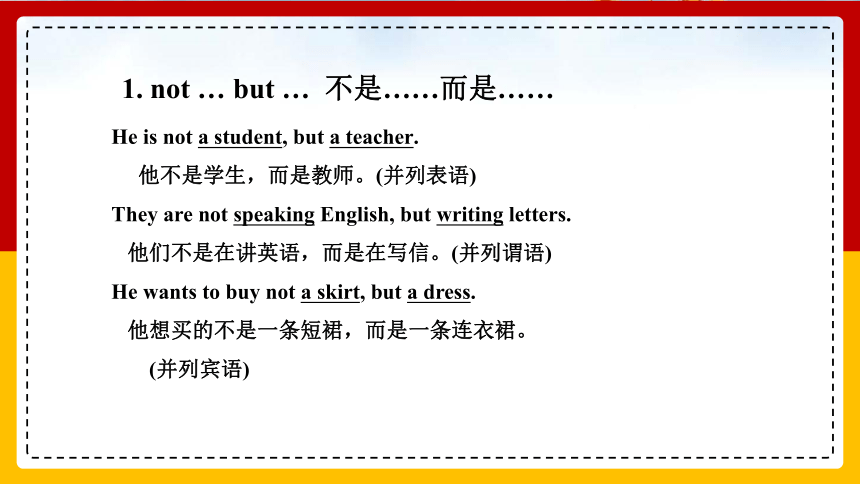
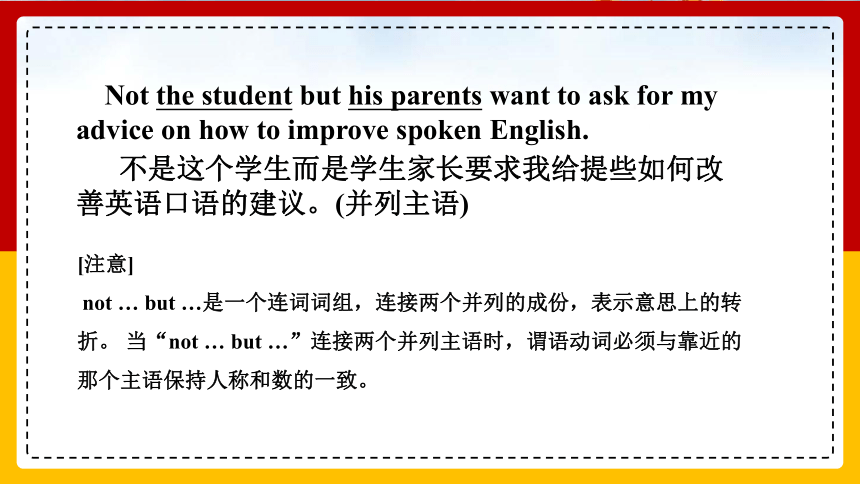
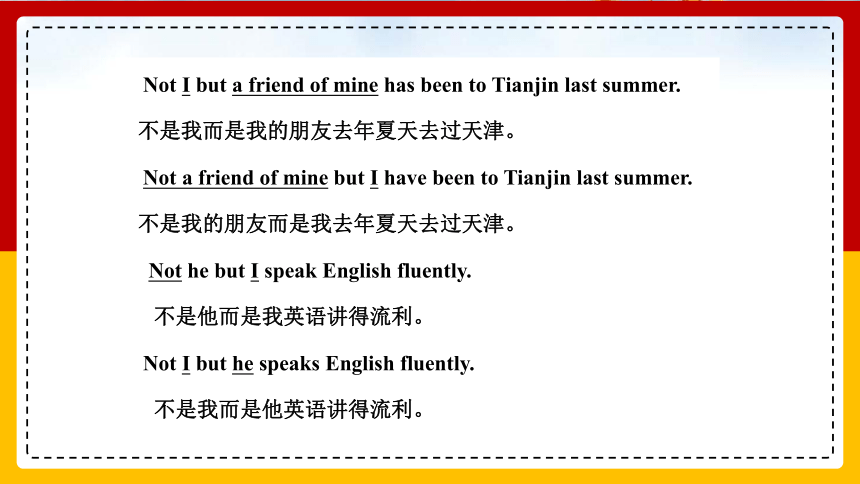
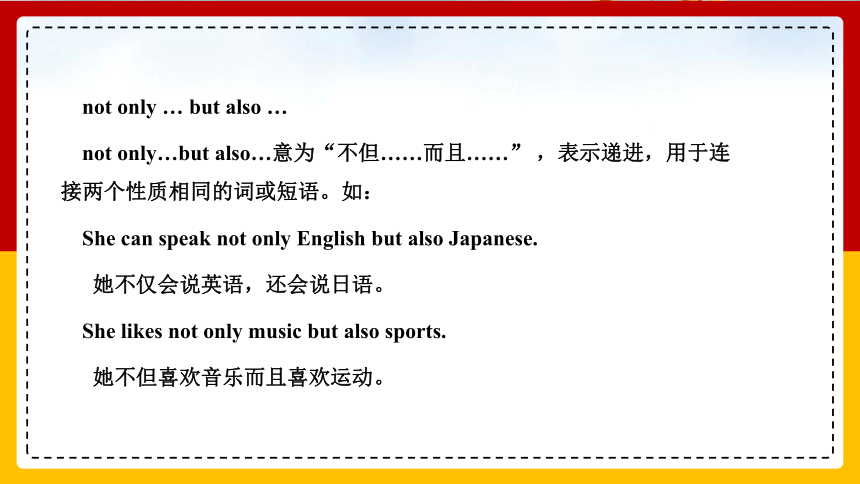
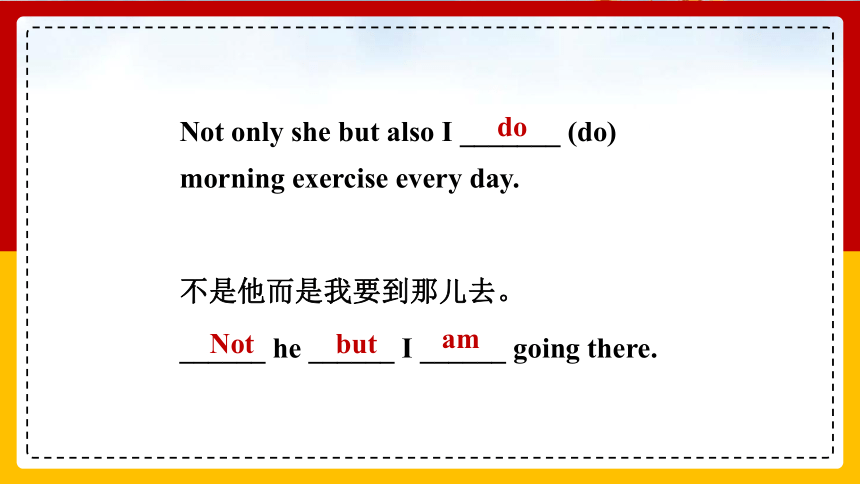
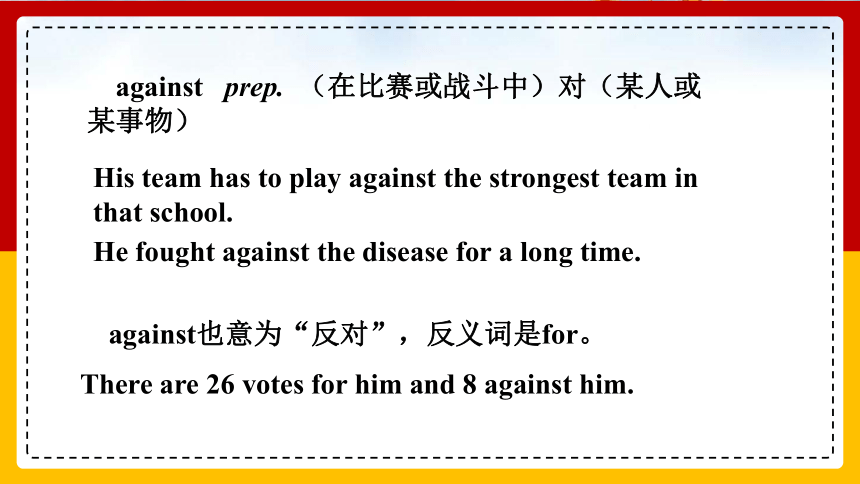
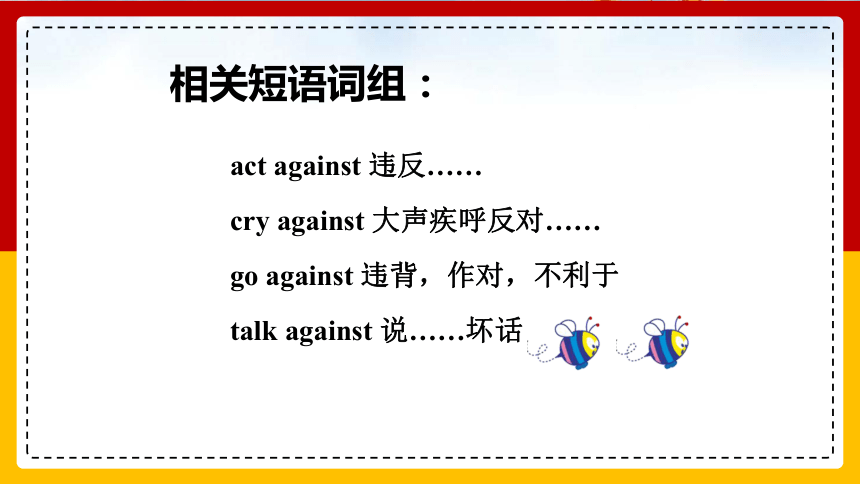
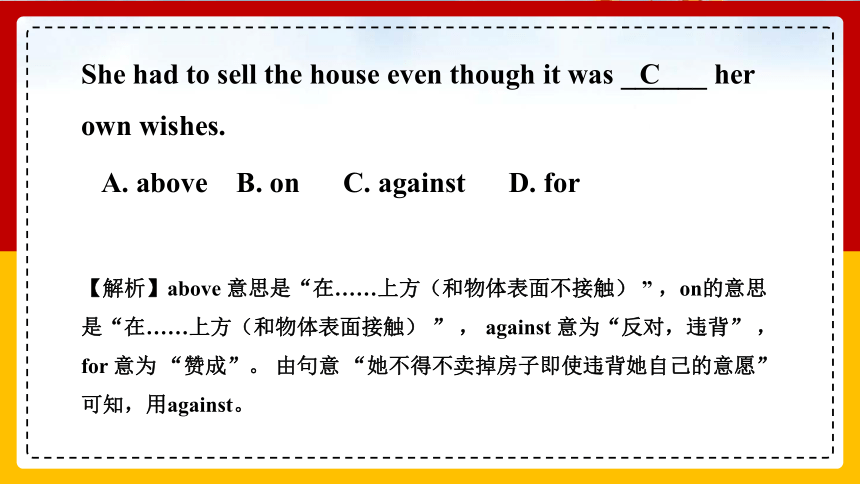
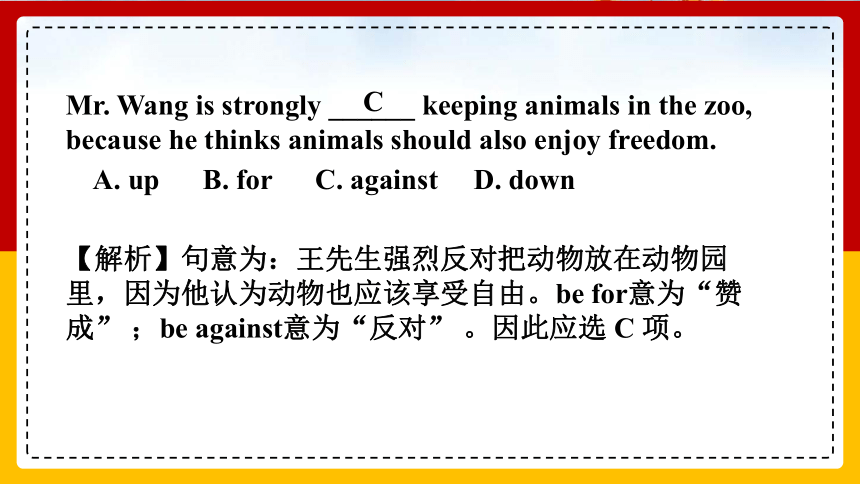
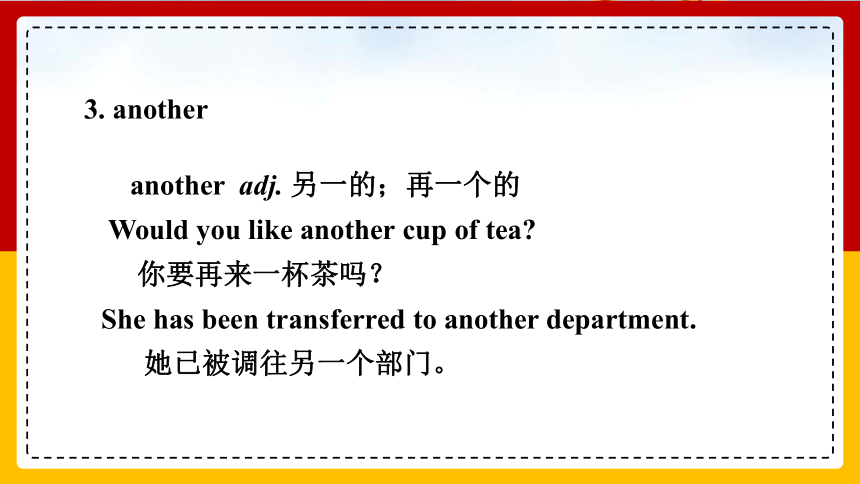
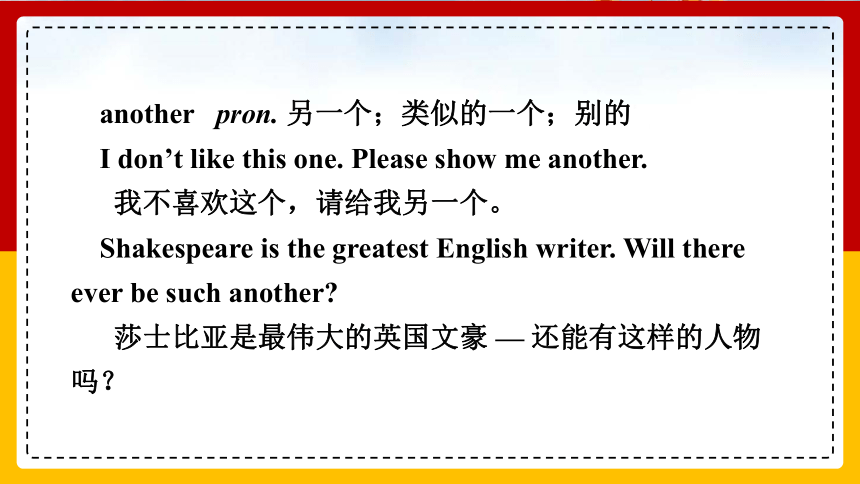
文档简介
(共43张PPT)
外研版《初中英语》八年级上册
Module
3
Unit
2
1.
not
…
but
…
不是……而是……
He
is
not
a
student,
but
a
teacher.
他不是学生,而是教师。(并列表语)
They
are
not
speaking
English,
but
writing
letters.
他们不是在讲英语,而是在写信。(并列谓语)
He
wants
to
buy
not
a
skirt,
but
a
dress.
他想买的不是一条短裙,而是一条连衣裙。
(并列宾语)
Not
the
student
but
his
parents
want
to
ask
for
my
advice
on
how
to
improve
spoken
English.
不是这个学生而是学生家长要求我给提些如何改善英语口语的建议。(并列主语)
[注意]
not
…
but
…是一个连词词组,连接两个并列的成份,表示意思上的转折。
当“not
…
but
…”连接两个并列主语时,谓语动词必须与靠近的那个主语保持人称和数的一致。
Not
I
but
a
friend
of
mine
has
been
to
Tianjin
last
summer.
不是我而是我的朋友去年夏天去过天津。
Not
a
friend
of
mine
but
I
have
been
to
Tianjin
last
summer.
不是我的朋友而是我去年夏天去过天津。
Not
he
but
I
speak
English
fluently.
不是他而是我英语讲得流利。
Not
I
but
he
speaks
English
fluently.
不是我而是他英语讲得流利。
not
only
…
but
also
…
not
only…but
also…意为“不但……而且……”
,表示递进,用于连接两个性质相同的词或短语。如:
She
can
speak
not
only
English
but
also
Japanese.
她不仅会说英语,还会说日语。
She
likes
not
only
music
but
also
sports.
她不但喜欢音乐而且喜欢运动。
Not
only
she
but
also
I
_______
(do)
morning
exercise
every
day.
不是他而是我要到那儿去。
______
he
______
I
______
going
there.
do
Not
but
am
against
prep.
(在比赛或战斗中)对(某人或某事物)
against也意为“反对”,反义词是for。
There
are
26
votes
for
him
and
8
against
him.
His
team
has
to
play
against
the
strongest
team
in
that
school.
He
fought?against?the
disease
for
a
long
time.
??
act
against
违反……
cry
against
大声疾呼反对……
go
against
违背,作对,不利于
talk
against?说……坏话
相关短语词组:
She
had
to
sell
the
house
even
though
it
was
______
her
own
wishes.
A.
above
B.
on
C.
against
D.
for
【解析】above
意思是“在……上方(和物体表面不接触)
”
,on的意思是“在……上方(和物体表面接触)
”
,
against
意为“反对,违背”
,for
意为
“赞成”。
由句意
“她不得不卖掉房子即使违背她自己的意愿”
可知,用against。
C
Mr.
Wang
is
strongly
______
keeping
animals
in
the
zoo,
because
he
thinks
animals
should
also
enjoy
freedom.
A.
up
B.
for
C.
against
D.
down
【解析】句意为:王先生强烈反对把动物放在动物园里,因为他认为动物也应该享受自由。be
for意为“赞成”
;be
against意为“反对”
。因此应选
C
项。
C
3.
another
another
adj.
另一的;再一个的
Would
you
like?another?cup
of
tea?
你要再来一杯茶吗?
She
has
been
transferred
to
another
department.
她已被调往另一个部门。
another
pron.
另一个;类似的一个;别的
I
don’t
like
this
one.
Please
show
me
another.
我不喜欢这个,请给我另一个。
Shakespeare
is
the
greatest
English
writer.
Will
there
ever
be
such
another?
莎士比亚是最伟大的英国文豪
—
还能有这样的人物吗?
—
Everyone
knows
Canada
is
the
second
largest
country
in
the
world.
—
That
is,
it
is
larger
than
_______
country
in
Asia.
A.
any??????????
B.
any
other????????
C.
other?????????
D.
another
A
[辨
析]
other,
others,
another,
the
other和the
others的区别:
(1)
other用作形容词,意为“别的,其他的”,常用来修饰名词的复数形式。如:
Do
you
have
any
other
questions?
你还有其他问题吗?
(2)
others用作代词,泛指“其他的(人或物)”,
相当于“
other
+
复数名词”
。如:
Some
students
are
singing,
and
others
/
other
students
are
dancing.
一些学生在唱歌,其他的学生在跳舞。
—
Give
me
some
others,
please.
请给我别的东西吧!
—
There
are
no
others.
没有别的了。
(3)
another既可作形容词,也可作代词,只能用于三个或更多的人或物,泛指同类事物中的三者或三者以上的“另一个”,只能代替或修饰单数可数名词。如:
I
don’t
like
this
one.
Please
show
me
another
pair
of
glass.
我不喜欢这个,请给我看看另一副眼镜。
I
have
three
daughters.
One
is
a
nurse,
another
is
a
teacher
and
another
is
a
worker.
我有三个女儿。一个是护士,另一个是教师,还有一个是工人。
(4)
the
other是代词,指“(两个人或物中的)另一个”,常与one连用。如:
He
has
two
daughters.
One
is
a
nurse,
and
the
other
is
a
worker.
他有两个女儿,一个是护士,另一个是工人。
注意:the
other也可后面加单数名词或复数名词。如:
On
the
other
side
of
the
street,
there
is
a
tall
building.
在街道的另一边,有一栋高楼。
Mary
is
much
taller
than
the
other
girls.
玛丽比其他的女孩高得多。
(5)
the
others用作代词,特指某一范围内的“其他的(人或物)”,相当于“the
other
+复数名词”。如:
Two
boys
will
go
to
the
park,
and
the
others
/
the
other
boys
will
stay
at
home.
两个男孩将去公园,其余的将留在家里。
1.
Will
you
show
me
________
one?
I
don’t
like
it’s
colour.
2.
She
has
two
computers.
One
is
IBM
PC
386
and
_________
is
IBM
PC
586.
3.Tom
runs
faster
than
any
________
student
in
his
class.
4.
The
students
have
English,
Chinese,
maths,
biology
and
many
________
subjects.
Practice
another
the
other
other
other
5.
Why
are
only
three
of
you
here
in
the
classroom?
Where
are
_________?
6.
My
classmates
come
from
different
parts
of
the
country.
Some
come
from
Shanghai,
some
from
Tianjin
and
________
from
Beijing.
others
the
others
1.
做这事还有其他的办法。
2.
其他学生都到哪里去了?
3.
别的人可能不这样想。
4.
他比班上其他学生聪明。
Complete
the
sentences.
There
are
______
ways
of
doing
it.
Where
have
____
________
students
gone?
______
____________
may
not
think
that
way.
He
is
cleverer
than
_________
in
his
class.
other
the
other
Others
/
Other
people
the
others
/
the
other
students
5.
他们已经有了三个孩子,很快又将有一个。
They’ve
got
three
children
already
and
they’re
having
__________.
6.
我不喜欢这个房间,咱们另要一间吧。
I
don’t
like
this
room
—
let’s
ask
for
_________.
another
another
4.
practice
practice
n.
练习
Daily
practice
is
the
trick
in
learning
a
foreign
language.
每天练习是学会一门外语的诀窍。
practice在英式英语中只作名词,动词为practise,而在美式英语中,practice可作名词或动词,practise很少见。
in
practice
实际上,事实上
be/get/out
of
practice
生疏
/
疏于练习
Practice
makes
perfect.
熟能生巧。(谚语)
practice作名词,前面有形容词时,冠词a可加可不加。
It
is
(a)
good
practice
to
get
up
early.
早起是一个好习惯。
If
you
want
to
do
better
in
playing
the
piano,
you
need
more
_______.
A.
technology
B.
practice
C.
pleasure
D.
challenge
【解析】考查名词词义辨析。practice意为“练习”
。
B
practise
v.
练习
I
need
to
practise
my
Italian
before
my
business
trip.
我出差之前需要练习一下意大利语。
practise用作及物动词时后面可接名词、动名词,不能接不定式。如:
They’re
practising
singing
the
new
song.
他们正在练习唱那首新歌。
He
practised
tennis
/
the
piano
for
two
hours
every
day.
他每天练两个小时网球/钢琴。
practise可用作不及物动词
Practise
more
and
you’ll
make
progress.
勤练习,你一定会进步的。
Don’t
forget
to
practise
after
class.
课后别忘了练习。
(
)
Before
she
went
abroad,
she
spent
as
much
time
as
she
could
________
English.
A.
to
practise
to
speak
B.
practising
speaking
C.
to
practise
speaking
D.
practising
to
speak
B
Practice
在她出国之前,她用了很多时间练习英语。
这里考查两个动词的搭配。第一个,spend
time
(in)
doing
sth
,
in可省略,花时间做某事;第二个,practise
后接动名词,不接不定式。
5.
warm
up
warm
up
热身;做准备活动
The
coach
warmed
up
the
players
before
the
game.
比赛前教练让运动员热身。
Let's
do
some
exercise
to
warm
up
a
bit.
让咱们先做做操,热身一下。
6.
pleased
pleased
adj.
开心的;满足的
He
was
pleased
with
their
warm
welcome.
他们的热烈欢迎让他感到很高兴。
I
am
very
pleased
to
eat
this
kind
of
delicious
food.
吃到这种好吃的食物,我很是满足。
1)
I’m
so
glad
to
see
you.
A.
sad
B.
angry
C.
pleased
2)
—
Mary
seems
_______
today.
—
I
hear
someone
took
away
her
new
bike.
A.
alone
B.
sad
C.
angrily
D.
pleased
3)
—
Mum,
I’m
really
_______
about
the
result
of
the
exam.
—
Cheer
up.
I
believe
you
can
be
successful.
A.
patient
B.
satisfied
C.
unhappy
D.
pleased
B
C
C
pleasant作形容词,意为“令人愉悦的,
舒适的”。常见搭配:be
pleasant
to
do
sth.
意为“做某事愉悦
/
舒适”。如:
We
spent
many
hours
in
a
pleasant
conversation.
我们畅谈了好几个小时。
[链接]
pleasant还可意为“友好的;和善的”。常见搭配:be
pleasant
to
sb.
意为“对某人友好/
和善”。?如:?
Flowers
are
pleasant
to
look
at
but
hard
to
grow.
看花容易栽花难。
You
should
be
pleasant
to
the
customers.
你应该对顾客友好。
pleasant和pleased
这两个词都可表示“愉快的”。其区别是:
pleasant表示“令人愉快的”,常说明事物;pleased表示“愉快的”,常说明人。例如:
We
spent
a
very?pleasant?evening.
??
我们度过了一个愉快的夜晚。
We
are
very
pleased
here.
我们在这里很高兴。
[辨析]
How
________
it
is
to
see
you
again!
A.
happily
B.
pleased
C.
glad
D.
pleasant
How
______
I
am
to
see
you
again!
A.
good
B.
pleased
C.
nice
D.
pleasant
D
B
7.
…
have
a
chance
of
doing
…
have
a
chance
of
doing
sth.
有做某事的机会
I
will
have
a
chance
of
achieving
my
dream.
我将会有一个实现我梦想的机会。
Do
you
think
you
have
a
chance
of
succeeding?
你认为你有成功的机会吗?
have
no
chance
(of)
没有(……的)可能
let
the
chance
go
放过机会
try
one’s
chance
试一试运气
wait
for
a
chance
等待机会
give
sb.
a
chance
给某人机会
相关词组短语:
根据汉语提示,结合句子意思,在横线上写出恰当的单词或词组。
If
you
try
your
best
now,
you
are
sure
to
have
a
chance
of
__________________
(实现)
your
dream.
realizing
/
achieving
8.
loudly
loudly
adv.
大声地;高声地
As
we
walked
in
the
dark
street,
we
sang
songs
and
talked?loudly.
当我们在黑洞洞的街上走路时我们高声地唱歌说话。
She
went
straight
up
to
the
door
and
knocked?loudly.??
她径直走到门口重重地敲门。
When
an
earthquake
happens,
and
you
are
outdoors,
you
should
go
to
an
open
area
as
______
as
possible.
A.
quickly
B.
quietly
C.
loudly
D.
slowly
Don’t
talk
______.
Your
grandmother
is
sleeping
now.
A.
loud
B.
hardly
C.
loudly
D.
hard
A
C
[辨析]
loud,
loudly这些副词均含有“高声地、大声地”之意。
loud
作副词时,表示“大声地”,主要指说话声和笑声等。
After
we
heard
the
joke,
we
laughed
loud
and
long.
Try
to
sing
the
song
louder.
loudly表示“大声地,吵闹地”,可指人声、敲门声或其他各种声音,强调声音高、喧闹、不悦耳。
It’s
not
polite
to
speak??______?in
public.
The
music
is
too
______;
please
turn
it
down.
He
knocked
at
the
door
so
______
that
his
neighbour
became
a
little
angry.
John
speaks?______?and
clear.
loud
loudly
loud
loudly
外研版《初中英语》八年级上册
教学课件
非常感谢收看
外研版《初中英语》八年级上册
Module
3
Unit
2
1.
not
…
but
…
不是……而是……
He
is
not
a
student,
but
a
teacher.
他不是学生,而是教师。(并列表语)
They
are
not
speaking
English,
but
writing
letters.
他们不是在讲英语,而是在写信。(并列谓语)
He
wants
to
buy
not
a
skirt,
but
a
dress.
他想买的不是一条短裙,而是一条连衣裙。
(并列宾语)
Not
the
student
but
his
parents
want
to
ask
for
my
advice
on
how
to
improve
spoken
English.
不是这个学生而是学生家长要求我给提些如何改善英语口语的建议。(并列主语)
[注意]
not
…
but
…是一个连词词组,连接两个并列的成份,表示意思上的转折。
当“not
…
but
…”连接两个并列主语时,谓语动词必须与靠近的那个主语保持人称和数的一致。
Not
I
but
a
friend
of
mine
has
been
to
Tianjin
last
summer.
不是我而是我的朋友去年夏天去过天津。
Not
a
friend
of
mine
but
I
have
been
to
Tianjin
last
summer.
不是我的朋友而是我去年夏天去过天津。
Not
he
but
I
speak
English
fluently.
不是他而是我英语讲得流利。
Not
I
but
he
speaks
English
fluently.
不是我而是他英语讲得流利。
not
only
…
but
also
…
not
only…but
also…意为“不但……而且……”
,表示递进,用于连接两个性质相同的词或短语。如:
She
can
speak
not
only
English
but
also
Japanese.
她不仅会说英语,还会说日语。
She
likes
not
only
music
but
also
sports.
她不但喜欢音乐而且喜欢运动。
Not
only
she
but
also
I
_______
(do)
morning
exercise
every
day.
不是他而是我要到那儿去。
______
he
______
I
______
going
there.
do
Not
but
am
against
prep.
(在比赛或战斗中)对(某人或某事物)
against也意为“反对”,反义词是for。
There
are
26
votes
for
him
and
8
against
him.
His
team
has
to
play
against
the
strongest
team
in
that
school.
He
fought?against?the
disease
for
a
long
time.
??
act
against
违反……
cry
against
大声疾呼反对……
go
against
违背,作对,不利于
talk
against?说……坏话
相关短语词组:
She
had
to
sell
the
house
even
though
it
was
______
her
own
wishes.
A.
above
B.
on
C.
against
D.
for
【解析】above
意思是“在……上方(和物体表面不接触)
”
,on的意思是“在……上方(和物体表面接触)
”
,
against
意为“反对,违背”
,for
意为
“赞成”。
由句意
“她不得不卖掉房子即使违背她自己的意愿”
可知,用against。
C
Mr.
Wang
is
strongly
______
keeping
animals
in
the
zoo,
because
he
thinks
animals
should
also
enjoy
freedom.
A.
up
B.
for
C.
against
D.
down
【解析】句意为:王先生强烈反对把动物放在动物园里,因为他认为动物也应该享受自由。be
for意为“赞成”
;be
against意为“反对”
。因此应选
C
项。
C
3.
another
another
adj.
另一的;再一个的
Would
you
like?another?cup
of
tea?
你要再来一杯茶吗?
She
has
been
transferred
to
another
department.
她已被调往另一个部门。
another
pron.
另一个;类似的一个;别的
I
don’t
like
this
one.
Please
show
me
another.
我不喜欢这个,请给我另一个。
Shakespeare
is
the
greatest
English
writer.
Will
there
ever
be
such
another?
莎士比亚是最伟大的英国文豪
—
还能有这样的人物吗?
—
Everyone
knows
Canada
is
the
second
largest
country
in
the
world.
—
That
is,
it
is
larger
than
_______
country
in
Asia.
A.
any??????????
B.
any
other????????
C.
other?????????
D.
another
A
[辨
析]
other,
others,
another,
the
other和the
others的区别:
(1)
other用作形容词,意为“别的,其他的”,常用来修饰名词的复数形式。如:
Do
you
have
any
other
questions?
你还有其他问题吗?
(2)
others用作代词,泛指“其他的(人或物)”,
相当于“
other
+
复数名词”
。如:
Some
students
are
singing,
and
others
/
other
students
are
dancing.
一些学生在唱歌,其他的学生在跳舞。
—
Give
me
some
others,
please.
请给我别的东西吧!
—
There
are
no
others.
没有别的了。
(3)
another既可作形容词,也可作代词,只能用于三个或更多的人或物,泛指同类事物中的三者或三者以上的“另一个”,只能代替或修饰单数可数名词。如:
I
don’t
like
this
one.
Please
show
me
another
pair
of
glass.
我不喜欢这个,请给我看看另一副眼镜。
I
have
three
daughters.
One
is
a
nurse,
another
is
a
teacher
and
another
is
a
worker.
我有三个女儿。一个是护士,另一个是教师,还有一个是工人。
(4)
the
other是代词,指“(两个人或物中的)另一个”,常与one连用。如:
He
has
two
daughters.
One
is
a
nurse,
and
the
other
is
a
worker.
他有两个女儿,一个是护士,另一个是工人。
注意:the
other也可后面加单数名词或复数名词。如:
On
the
other
side
of
the
street,
there
is
a
tall
building.
在街道的另一边,有一栋高楼。
Mary
is
much
taller
than
the
other
girls.
玛丽比其他的女孩高得多。
(5)
the
others用作代词,特指某一范围内的“其他的(人或物)”,相当于“the
other
+复数名词”。如:
Two
boys
will
go
to
the
park,
and
the
others
/
the
other
boys
will
stay
at
home.
两个男孩将去公园,其余的将留在家里。
1.
Will
you
show
me
________
one?
I
don’t
like
it’s
colour.
2.
She
has
two
computers.
One
is
IBM
PC
386
and
_________
is
IBM
PC
586.
3.Tom
runs
faster
than
any
________
student
in
his
class.
4.
The
students
have
English,
Chinese,
maths,
biology
and
many
________
subjects.
Practice
another
the
other
other
other
5.
Why
are
only
three
of
you
here
in
the
classroom?
Where
are
_________?
6.
My
classmates
come
from
different
parts
of
the
country.
Some
come
from
Shanghai,
some
from
Tianjin
and
________
from
Beijing.
others
the
others
1.
做这事还有其他的办法。
2.
其他学生都到哪里去了?
3.
别的人可能不这样想。
4.
他比班上其他学生聪明。
Complete
the
sentences.
There
are
______
ways
of
doing
it.
Where
have
____
________
students
gone?
______
____________
may
not
think
that
way.
He
is
cleverer
than
_________
in
his
class.
other
the
other
Others
/
Other
people
the
others
/
the
other
students
5.
他们已经有了三个孩子,很快又将有一个。
They’ve
got
three
children
already
and
they’re
having
__________.
6.
我不喜欢这个房间,咱们另要一间吧。
I
don’t
like
this
room
—
let’s
ask
for
_________.
another
another
4.
practice
practice
n.
练习
Daily
practice
is
the
trick
in
learning
a
foreign
language.
每天练习是学会一门外语的诀窍。
practice在英式英语中只作名词,动词为practise,而在美式英语中,practice可作名词或动词,practise很少见。
in
practice
实际上,事实上
be/get/out
of
practice
生疏
/
疏于练习
Practice
makes
perfect.
熟能生巧。(谚语)
practice作名词,前面有形容词时,冠词a可加可不加。
It
is
(a)
good
practice
to
get
up
early.
早起是一个好习惯。
If
you
want
to
do
better
in
playing
the
piano,
you
need
more
_______.
A.
technology
B.
practice
C.
pleasure
D.
challenge
【解析】考查名词词义辨析。practice意为“练习”
。
B
practise
v.
练习
I
need
to
practise
my
Italian
before
my
business
trip.
我出差之前需要练习一下意大利语。
practise用作及物动词时后面可接名词、动名词,不能接不定式。如:
They’re
practising
singing
the
new
song.
他们正在练习唱那首新歌。
He
practised
tennis
/
the
piano
for
two
hours
every
day.
他每天练两个小时网球/钢琴。
practise可用作不及物动词
Practise
more
and
you’ll
make
progress.
勤练习,你一定会进步的。
Don’t
forget
to
practise
after
class.
课后别忘了练习。
(
)
Before
she
went
abroad,
she
spent
as
much
time
as
she
could
________
English.
A.
to
practise
to
speak
B.
practising
speaking
C.
to
practise
speaking
D.
practising
to
speak
B
Practice
在她出国之前,她用了很多时间练习英语。
这里考查两个动词的搭配。第一个,spend
time
(in)
doing
sth
,
in可省略,花时间做某事;第二个,practise
后接动名词,不接不定式。
5.
warm
up
warm
up
热身;做准备活动
The
coach
warmed
up
the
players
before
the
game.
比赛前教练让运动员热身。
Let's
do
some
exercise
to
warm
up
a
bit.
让咱们先做做操,热身一下。
6.
pleased
pleased
adj.
开心的;满足的
He
was
pleased
with
their
warm
welcome.
他们的热烈欢迎让他感到很高兴。
I
am
very
pleased
to
eat
this
kind
of
delicious
food.
吃到这种好吃的食物,我很是满足。
1)
I’m
so
glad
to
see
you.
A.
sad
B.
angry
C.
pleased
2)
—
Mary
seems
_______
today.
—
I
hear
someone
took
away
her
new
bike.
A.
alone
B.
sad
C.
angrily
D.
pleased
3)
—
Mum,
I’m
really
_______
about
the
result
of
the
exam.
—
Cheer
up.
I
believe
you
can
be
successful.
A.
patient
B.
satisfied
C.
unhappy
D.
pleased
B
C
C
pleasant作形容词,意为“令人愉悦的,
舒适的”。常见搭配:be
pleasant
to
do
sth.
意为“做某事愉悦
/
舒适”。如:
We
spent
many
hours
in
a
pleasant
conversation.
我们畅谈了好几个小时。
[链接]
pleasant还可意为“友好的;和善的”。常见搭配:be
pleasant
to
sb.
意为“对某人友好/
和善”。?如:?
Flowers
are
pleasant
to
look
at
but
hard
to
grow.
看花容易栽花难。
You
should
be
pleasant
to
the
customers.
你应该对顾客友好。
pleasant和pleased
这两个词都可表示“愉快的”。其区别是:
pleasant表示“令人愉快的”,常说明事物;pleased表示“愉快的”,常说明人。例如:
We
spent
a
very?pleasant?evening.
??
我们度过了一个愉快的夜晚。
We
are
very
pleased
here.
我们在这里很高兴。
[辨析]
How
________
it
is
to
see
you
again!
A.
happily
B.
pleased
C.
glad
D.
pleasant
How
______
I
am
to
see
you
again!
A.
good
B.
pleased
C.
nice
D.
pleasant
D
B
7.
…
have
a
chance
of
doing
…
have
a
chance
of
doing
sth.
有做某事的机会
I
will
have
a
chance
of
achieving
my
dream.
我将会有一个实现我梦想的机会。
Do
you
think
you
have
a
chance
of
succeeding?
你认为你有成功的机会吗?
have
no
chance
(of)
没有(……的)可能
let
the
chance
go
放过机会
try
one’s
chance
试一试运气
wait
for
a
chance
等待机会
give
sb.
a
chance
给某人机会
相关词组短语:
根据汉语提示,结合句子意思,在横线上写出恰当的单词或词组。
If
you
try
your
best
now,
you
are
sure
to
have
a
chance
of
__________________
(实现)
your
dream.
realizing
/
achieving
8.
loudly
loudly
adv.
大声地;高声地
As
we
walked
in
the
dark
street,
we
sang
songs
and
talked?loudly.
当我们在黑洞洞的街上走路时我们高声地唱歌说话。
She
went
straight
up
to
the
door
and
knocked?loudly.??
她径直走到门口重重地敲门。
When
an
earthquake
happens,
and
you
are
outdoors,
you
should
go
to
an
open
area
as
______
as
possible.
A.
quickly
B.
quietly
C.
loudly
D.
slowly
Don’t
talk
______.
Your
grandmother
is
sleeping
now.
A.
loud
B.
hardly
C.
loudly
D.
hard
A
C
[辨析]
loud,
loudly这些副词均含有“高声地、大声地”之意。
loud
作副词时,表示“大声地”,主要指说话声和笑声等。
After
we
heard
the
joke,
we
laughed
loud
and
long.
Try
to
sing
the
song
louder.
loudly表示“大声地,吵闹地”,可指人声、敲门声或其他各种声音,强调声音高、喧闹、不悦耳。
It’s
not
polite
to
speak??______?in
public.
The
music
is
too
______;
please
turn
it
down.
He
knocked
at
the
door
so
______
that
his
neighbour
became
a
little
angry.
John
speaks?______?and
clear.
loud
loudly
loud
loudly
外研版《初中英语》八年级上册
教学课件
非常感谢收看
同课章节目录
- Module 1 How to learn English
- Unit 1 Let's try to speak English as much as possi
- Unit 2 You should smile at her.
- Unit 3 Language in use .
- Module 2 My home town and my country
- Unit 1 It's taller than many other buildings.
- Unit 2 Cambridge is a beautiful city in the east o
- Unit 3 Language in use .
- Module 3 Sports.
- Unit 1 Nothing is more exciting than playing tenni
- Unit 2 This year we training more carefully.
- Unit 3 Language in use .
- Module 4 Planes, ships and trains .
- Unit 1 He lives the farthest from school.
- Unit 2 What is the best way to travel.
- Unit 3 Language in use .
- Module 5 Lao She Teahouse.
- Unit 1 I wanted to see the Beijing Opera.
- Unit 2 It descibes the changes in Chinese society.
- Unit 3 Language in use .
- Module 6 Animals in danger.
- Unit 1 It allows people to get closer to them .
- Unit 2 The WWF is working hard to save them all.
- Unit 3 Language in use .
- Revision module A
- Module 7 A famous story
- Unit 1 Alice was sitting with her sister by the ri
- Unit 2 She was thinking about her cat.
- Unit 3 Language in use .
- Module 8 Accidents
- Unit 1 While the car were changing to red, a car s
- Unit 2 I was trying to pick it up when it bite me
- Unit 3 Language in use .
- Module 9 Population
- Unit 1 The population of China is about 1.37 billi
- Unit 2 Arnwick was a city with 200,000 people.
- Unit 3 Language in use .
- Module 10 The weathe
- Unit 1 It might snow.
- Unit 2 The weather is fine all year round.
- Unit 3 Language in use .
- Module 11 Way of life
- Unit 1 In China ,we open a gift later.
- Unit 2 In England, you usually drink tea with milk
- Unit 3 Language in use .
- Module 12 Help
- Unit 1 What should we do before help arrives?
- Unit 2 Stay away from windows and heavy furniture.
- Unit 3 Language in use .
- Revision module B
